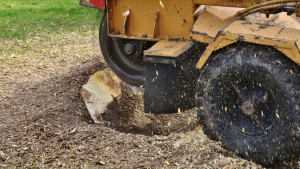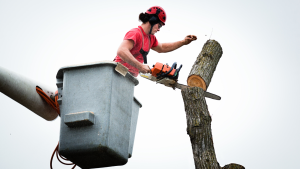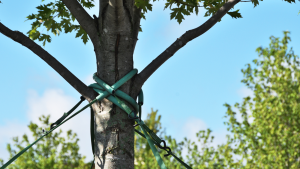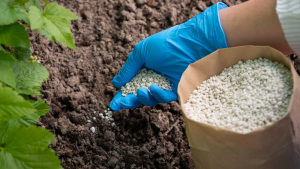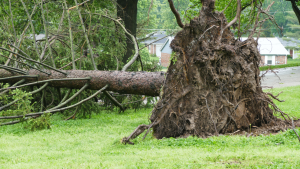In Joliet, Illinois, nature and city life blend together. Trees and plants make our city beautiful, but they face a hidden enemy: pests. Pest management is crucial to keep our green spaces healthy and vibrant. It’s like a secret battle to protect our plants. We must take care of our environment, understanding how humans and nature depend on each other. We have a responsibility to keep this delicate balance intact so that our landscape stays enchanting for everyone to enjoy. Dreaming of a picture-perfect yard? Let Joliet Tree Service make it a reality! Call us today for a free rate quote and start enjoying your beautiful outdoor space
Why is Pest Management Important in Trees and Plants?
Pest management is super important for keeping trees and plants healthy. It’s like a shield against bugs and diseases that can really hurt them. These pests can mess up leaves, mess with nature, and make our green areas messy. If we don’t stop them, they can even kill our plants. But don’t worry, we can fight back! By taking action early and using smart pest control methods, we can protect our environment. Let’s work together to make sure our trees and plants stay strong and keep our world beautiful for a long time.
The Warm and Humid Climate of Joliet, Illinois:
In Joliet, Illinois, our warm and humid weather is perfect for plants, but it also attracts a lot of pests. These pests, like emerald ash borers and Dutch elm disease, can cause big problems for our trees. It’s like a never-ending fight against them. Without stopping them, they can mess up our whole environment. We need to take action to keep our landscapes healthy and beautiful. By controlling pests, we can protect our green spaces and make sure they stay strong for the future.
Variety of Pests:
The pests that plague Joliet’s trees and plants are as diverse as they are insidious. Common adversaries include:
- Insects: Joliet’s verdant landscape is not immune to the relentless assault of insects. From the voracious appetite of aphids and beetles, which strip leaves bare with alarming efficiency, to the relentless march of caterpillars and mites, these tiny invaders pose a formidable threat to foliage, leaving a trail of destruction in their wake.
- Fungi: The moist, humid climate of Joliet provides the perfect breeding ground for fungal diseases to flourish. Among the most insidious are powdery mildew and leaf spot, which can spread like wildfire, covering leaves in a dusty coat or causing unsightly blemishes that mar the beauty of plants. Left unchecked, these fungal pathogens can wreak havoc, causing widespread damage and compromising the health of entire ecosystems.
- Pathogens: In addition to insects and fungi, Joliet’s trees and plants must also contend with the invisible menace of bacteria and viruses. These microscopic assailants infiltrate plant tissues, compromising their defenses and rendering them vulnerable to secondary infections and environmental stressors. As they weaken the very fabric of plant health, these pathogens pose a silent yet potent threat to the resilience of Joliet’s green spaces.
Implementing Effective Pest Management Strategies:
To combat these pests effectively, proactive measures must be taken. Regular inspections by trained arborists can help identify early signs of infestation or disease. Additionally, employing appropriate pesticide applications, whether organic or synthetic, can target pests while minimizing harm to beneficial organisms and the environment. Integrated pest management (IPM) techniques, which emphasize prevention and least-toxic interventions, offer a holistic approach to pest control that balances efficacy with sustainability.
Tips for Maintaining a Healthy Landscape:
In addition to implementing effective pest management strategies, adopting certain best practices is crucial for nurturing and sustaining a thriving landscape:
- Proper watering: Providing trees and plants with adequate moisture is essential for their growth and vitality. However, it’s equally important to strike a balance to prevent overwatering, which can lead to waterlogged soil and promote fungal growth. Utilize methods such as drip irrigation or soaker hoses to deliver water directly to the root zone, ensuring efficient uptake and minimizing water waste.
- Mulching: Applying a layer of organic mulch around trees and plants offers a multitude of benefits. Mulch helps retain soil moisture by reducing evaporation, thereby minimizing the need for frequent watering. Additionally, it acts as a natural weed suppressant, smothering unwanted vegetation and reducing competition for resources. Moreover, as mulch decomposes, it enriches the soil with essential nutrients, fostering healthy root development and overall plant vigor.
- Pruning: Regular pruning is akin to giving trees and plants a rejuvenating haircut, removing dead, damaged, or diseased branches to promote optimal health and vigor. By enhancing air circulation and sunlight penetration, pruning reduces the risk of fungal diseases and pest infestations. Furthermore, it helps shape the growth of trees and plants, improving their aesthetic appeal and structural integrity. Be sure to use sharp, sterile pruning tools and follow proper pruning techniques to minimize stress and maximize the benefits to your landscape.
Conclusion:
In conclusion, pest management is essential for safeguarding the beauty and vitality of Joliet’s natural landscapes. By understanding the challenges posed by pests, implementing effective management strategies, and adopting proactive maintenance practices, we can nurture our green spaces for generations to come. Together, let us embrace our role as stewards of nature and cultivate a thriving environment where trees and plants can flourish unhindered by the scourge of pests.

